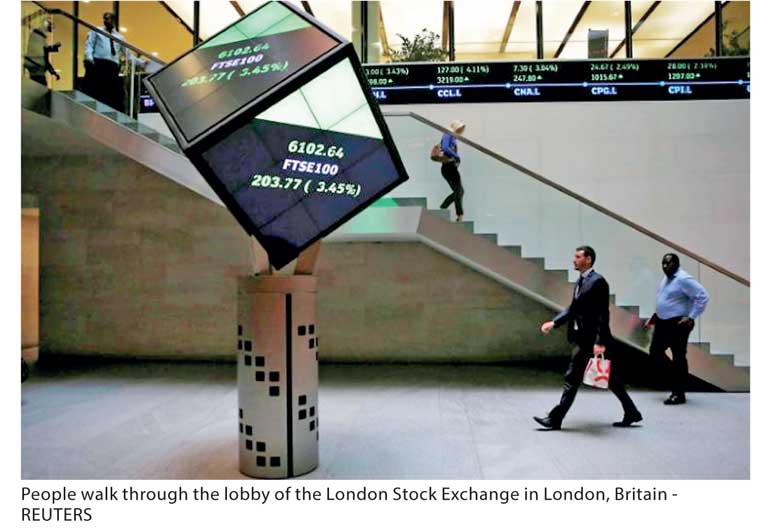Sunday Feb 22, 2026
Sunday Feb 22, 2026
Friday, 7 April 2017 00:00 - - {{hitsCtrl.values.hits}}
 Reuters: Stocks slipped and bonds rose on Thursday, with risk appetite soured by signs the Federal Reserve might start paring asset holdings later this year just as the chance of early US fiscal stimulus seems to be evaporating.
Reuters: Stocks slipped and bonds rose on Thursday, with risk appetite soured by signs the Federal Reserve might start paring asset holdings later this year just as the chance of early US fiscal stimulus seems to be evaporating.
Investors were also wary before a potentially tense meeting between US President Donald Trump and his Chinese counterpart Xi Jinping, the first between the world’s two most powerful leaders.
Topping the agenda at Trump’s Mar-a-Lago resort in Florida will be whether he makes good on his threat to use U.S.-China trade ties to pressure Beijing to do more to rein in its nuclear-armed neighbor North Korea.
Nerves were not helped when US Pacific Fleet Commander Admiral Scott Swift said any decision on a pre-emptive attack against North Korea would be up to Trump.
Lingering fears of a possible trade war had kept Asian markets on edge and Europe .FTEU3 was just as cautious. A 0.8% fall put the pan-regional FTSEurofirst .FTEU3 on course for its biggest fall in over a month. .EU
“Most portfolio managers think equities are the most overbought in 20 years and so anything that creates some kind of concern, well, it is an excuse to take profits,” said Pictet Asset Management’s chief strategist Luca Paolini.
He was referring to minutes of the Fed’s last meeting that showed most of the US Central Bank’s policymakers thought it should begin trimming its $ 4.5 trillion balance sheet later this year, earlier than many had expected.
Some Fed members also “viewed equity prices as quite high relative to standard valuation measures,” a rare comment on asset levels that also caught investors off guard.
Wall Street futures ESc1 pointed to opening falls of around 0.15% for the S&P 500, Dow Jones and Nasdaq. The Dow posted its largest intra-day downside reversal in 14 months on Wednesday in reaction to the Fed, shedding a near 200-point gain. [.N]
The dollar, which in comparison had barely budged, rose in early European trading. European Central Bank head Mario Draghi said the ECB had no plans to deviate from its stimulus program, which pushed the euro to a three-week low.
Broader sentiment had also been bruised overnight when US House of Representatives Speaker Paul Ryan said there was no consensus on tax reform and it would take longer to accomplish than healthcare.
Markets have risen in recent months in part on speculation fiscal stimulus would boost US growth and inflation.
“Trump’s agenda is falling to pieces,” said Pictet’s Paolini. “And that is probably the main concern (for stock market investors).”
Whiplash
The whiplash in sentiment saw Japan’s Nikkei .N225 hit its lowest since early December. Australia’s index also lost 0.5%. Shanghai .SSEC made marginal gains as a private survey of China’s service sector showed activity expanded at its slowest pace in six months in March.
“We were hit by a bucket of cold water,” said Norihiro Fujito, senior investment strategist at Mitsubishi UFJ Morgan Stanley Securities. “Signs that the Fed could pare its balance sheet are shocking enough, but the mood was exacerbated as the Fed touched upon stock valuations, which is very rare.”
The news overshadowed data showing U.S. private employers added a surprisingly strong 263,000 jobs in March, spurring speculation the official payrolls report on Friday would also impress.
Treasuries rallied, with yields on 10-year bonds back at 2.33% US10YT=RR and threatening to clear a chart barrier at 2.30%. Draghi’s comments also helped euro zone yields drop back towards multi-week lows.
The decline in yields prevented the dollar pulling away from the yen, where it was last at 110.46 JPY= near chart support in the 110.11/27 zone.
Among emerging market currencies, the rand remained vulnerable amid political uncertainty and there was also speculation that the Czech central bank could remove a peg that has been keeping the crown below 27-per-euro.
In commodity markets, oil ticked lower after the US Government reported a surprise increase in US crude inventories to a record high.
US crude CLcv1 was down 29 cents at $ 50.86 a barrel, while Brent LCOcv1 lost 27 cents to $ 54.09. [O/R]
Easily the biggest mover this week has been coking coal, which surged 43% on Singapore-listed futures after Cyclone Debbie slammed into top supplier Australia, crippling exports of the steelmaking fuel.